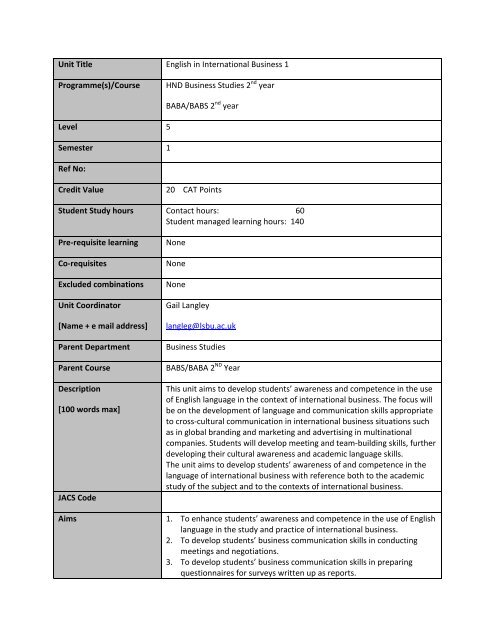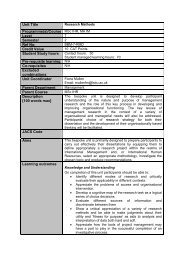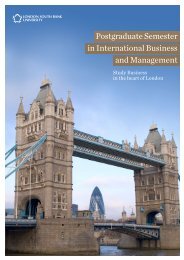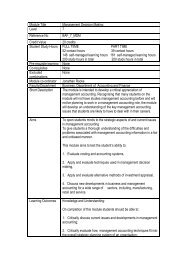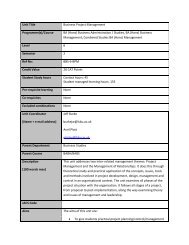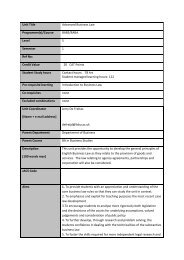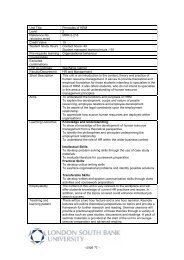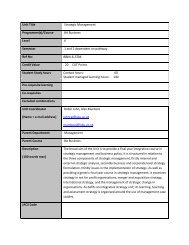Unit Title English in International Business 1 ... - Blc.lsbu.ac.uk
Unit Title English in International Business 1 ... - Blc.lsbu.ac.uk
Unit Title English in International Business 1 ... - Blc.lsbu.ac.uk
You also want an ePaper? Increase the reach of your titles
YUMPU automatically turns print PDFs into web optimized ePapers that Google loves.
<strong>Unit</strong> <strong>Title</strong> <br />
Programme(s)/Course <br />
<strong>English</strong> <strong>in</strong> <strong>International</strong> Bus<strong>in</strong>ess 1 <br />
HND Bus<strong>in</strong>ess Studies 2 nd year <br />
BABA/BABS 2 nd year <br />
Level <br />
Semester <br />
5 <br />
1 <br />
Ref No: <br />
Credit Value <br />
20 CAT Po<strong>in</strong>ts <br />
Student Study hours Cont<strong>ac</strong>t hours: 60 <br />
Student managed learn<strong>in</strong>g hours: 140 <br />
Pre-‐requisite learn<strong>in</strong>g <br />
Co-‐requisites <br />
Excluded comb<strong>in</strong>ations <br />
<strong>Unit</strong> Coord<strong>in</strong>ator <br />
[Name + e mail address] <br />
Parent Department <br />
Parent Course <br />
Description <br />
[100 words max] <br />
JACS Code <br />
Aims <br />
None <br />
None <br />
None <br />
Gail Langley <br />
langleg@<strong>lsbu</strong>.<strong>ac</strong>.<strong>uk</strong> <br />
Bus<strong>in</strong>ess Studies <br />
BABS/BABA 2 ND Year <br />
This unit aims to develop students’ awareness and competence <strong>in</strong> the use <br />
of <strong>English</strong> language <strong>in</strong> the context of <strong>in</strong>ternational bus<strong>in</strong>ess. The focus will <br />
be on the development of language and communication skills appropriate <br />
to cross-‐cultural communication <strong>in</strong> <strong>in</strong>ternational bus<strong>in</strong>ess situations such <br />
as <strong>in</strong> global brand<strong>in</strong>g and market<strong>in</strong>g and advertis<strong>in</strong>g <strong>in</strong> mult<strong>in</strong>ational <br />
companies. Students will develop meet<strong>in</strong>g and team-‐build<strong>in</strong>g skills, further <br />
develop<strong>in</strong>g their cultural awareness and <strong>ac</strong>ademic language skills. <br />
The unit aims to develop students’ awareness of and competence <strong>in</strong> the <br />
language of <strong>in</strong>ternational bus<strong>in</strong>ess with reference both to the <strong>ac</strong>ademic <br />
study of the subject and to the contexts of <strong>in</strong>ternational bus<strong>in</strong>ess. <br />
1. To enhance students’ awareness and competence <strong>in</strong> the use of <strong>English</strong> <br />
language <strong>in</strong> the study and pr<strong>ac</strong>tice of <strong>in</strong>ternational bus<strong>in</strong>ess. <br />
2. To develop students’ bus<strong>in</strong>ess communication skills <strong>in</strong> conduct<strong>in</strong>g <br />
meet<strong>in</strong>gs and negotiations. <br />
3. To develop students’ bus<strong>in</strong>ess communication skills <strong>in</strong> prepar<strong>in</strong>g <br />
questionnaires for surveys written up as reports.
Learn<strong>in</strong>g outcomes <br />
4. To develop students’ ability to write bus<strong>in</strong>ess letters <strong>ac</strong>ross a range of <br />
situations. <br />
5. To further develop students’ <strong>ac</strong>ademic language skills, spoken and <br />
written. <br />
6. To enhance students’ understand<strong>in</strong>g of current issues <strong>in</strong> <strong>in</strong>ternational <br />
bus<strong>in</strong>ess. <br />
On successful completion of the unit students will be able to: <br />
Knowledge and Understand<strong>in</strong>g: <br />
Prepare questionnaires, conduct surveys and write a report from the data <br />
collected. <br />
Write bus<strong>in</strong>ess emails and letters <strong>ac</strong>ross a range of general bus<strong>in</strong>ess <br />
situations. <br />
Understand how to communicate effectively <strong>in</strong> meet<strong>in</strong>gs and negotiations <br />
Intellectual Skills: <br />
Critically analyse <strong>in</strong>formation <br />
Pr<strong>ac</strong>tical Skills: <br />
Understand<strong>in</strong>g of the use of language <strong>in</strong> <strong>in</strong>ternational bus<strong>in</strong>ess. <br />
Present bus<strong>in</strong>ess <strong>in</strong>formation orally through a paired presentation <br />
requir<strong>in</strong>g teamwork. <br />
Develop surveys us<strong>in</strong>g questionnaires <br />
Write a report us<strong>in</strong>g the data collected. <br />
Use the language of <strong>in</strong>ternational bus<strong>in</strong>ess through improved <br />
understand<strong>in</strong>g of cross-‐cultural communication. <br />
Transferable Skills: <br />
Language skills: to further develop range, register and appropri<strong>ac</strong>y <strong>ac</strong>ross <br />
all four skills (speak<strong>in</strong>g, listen<strong>in</strong>g, read<strong>in</strong>g and writ<strong>in</strong>g). <br />
Communication skills: to further develop written and spoken presentation <br />
skills. <br />
Information skills: to further develop the ability to exploit a wide range of <br />
<strong>in</strong>formation sources efficiently, particularly from the current media. <br />
IT skills: to further develop the ability to use computers to f<strong>in</strong>d and <br />
present <strong>in</strong>formation effectivelyIndependent learn<strong>in</strong>g skills: to further <br />
develop <strong>in</strong>dependent learn<strong>in</strong>g skills through self-‐managed learn<strong>in</strong>g <br />
<strong>ac</strong>tivities. <br />
Employability <br />
The unit aims to enhance your employability by improv<strong>in</strong>g your language <br />
and communication skills <strong>in</strong> general, <strong>ac</strong>ademic and bus<strong>in</strong>ess registers. <br />
Research shows that employers are keenly <strong>in</strong>terested <strong>in</strong> the quality of <br />
employees’ language and communication skills so cont<strong>in</strong>u<strong>in</strong>g to improve <strong>in</strong>
this area can make you more employable. <br />
Te<strong>ac</strong>h<strong>in</strong>g & Learn<strong>in</strong>g <br />
Pattern <br />
Indicative content <br />
The te<strong>ac</strong>h<strong>in</strong>g and learn<strong>in</strong>g methods require you to participate fully <strong>in</strong> class <br />
as a range of <strong>in</strong>ter<strong>ac</strong>tive and communicative te<strong>ac</strong>h<strong>in</strong>g methods will be <br />
used such as pair and group work, role play and simulations. There will be <br />
analysis of authentic texts from different media and simulation of real-world<br />
situations through role plays and case studies. <br />
The syllabus will br<strong>in</strong>g together a blend of skills and topics us<strong>in</strong>g topics <br />
which allow effective contextualisation of language and bus<strong>in</strong>ess <br />
communication skills. Topics are broad-‐rang<strong>in</strong>g as the focus is on the <br />
language and language skills which can be derived from them. <br />
The ma<strong>in</strong> topics are: <br />
The use and role of language <strong>in</strong> <strong>in</strong>ternational bus<strong>in</strong>ess consider<strong>in</strong>g the <br />
pl<strong>ac</strong>e of <strong>English</strong> language, issues of globalisation such as global brand<strong>in</strong>g, <br />
global market<strong>in</strong>g, as well as enterprise, monopolies, corporate structure <br />
and <strong>in</strong>novation; cross-‐cultural communication <strong>in</strong> the context of <br />
<strong>in</strong>ternational bus<strong>in</strong>ess. <br />
The ma<strong>in</strong> language skills to be developed are: <br />
Cross-‐cultural communication skills, vocabulary development, extend<strong>in</strong>g <br />
the range of expression, improv<strong>in</strong>g <strong>ac</strong>cur<strong>ac</strong>y, improv<strong>in</strong>g mastery of <br />
different/appropriate registers. <br />
The ma<strong>in</strong> bus<strong>in</strong>ess communication skills to be developed are: <br />
Oral presentation skills, meet<strong>in</strong>g and negotiat<strong>in</strong>g skills, report writ<strong>in</strong>g, <br />
bus<strong>in</strong>ess letter writ<strong>in</strong>g and cross-‐cultural awareness <br />
The ma<strong>in</strong> study skills are: <br />
Survey and questionnaire techniques, oral and written presentation skills, <br />
research and analytical skills.
Assessment method <br />
(Please give details – <br />
elements, weight<strong>in</strong>gs, <br />
sequence of elements, <br />
f<strong>in</strong>al component) <br />
Total 100%: coursework 50%; exam<strong>in</strong>ation 50% <br />
COURSEWORK 50% <br />
1. Meet<strong>in</strong>g to negotiate: (10%) week 6-‐7 <br />
Negotiate some aspects of a bus<strong>in</strong>ess deal eg sales agreement, import-export<br />
agreement etc prepared from a case study <br />
2. Oral presentation <strong>in</strong> pairs (10%) week 9-‐10 <br />
The aim is to develop a new product to be launched <strong>in</strong> the near future. <br />
From the market research, prepare a 10 MINUTE presentation with a <br />
partner to outl<strong>in</strong>e the aims, specifications and market<strong>in</strong>g strategy for the <br />
product /service.Include a webpage and/ or short visual commercial to <br />
promote the product service. <br />
3. PORTFOLI0 (30%) week 12 <br />
Report (20%) On a plan to launch a new product or service via the <br />
<strong>in</strong>ternet <strong>in</strong> the near future. To f<strong>in</strong>d out what potential the product or <br />
service has <strong>in</strong> the market pl<strong>ac</strong>e, prepare and adm<strong>in</strong>ister a questionnaire <br />
survey. <br />
Personal development progress review (10%): <br />
Write 200-‐250 words review<strong>in</strong>g personal development <strong>in</strong> language and <br />
communication skills for this unit. <br />
EXAMINATION : 50% <br />
A two-‐hour written exam<strong>in</strong>ation <strong>in</strong> which there are two questions: <br />
1) Write 2 bus<strong>in</strong>ess letters or emails <strong>in</strong> response to a situation: 20% e<strong>ac</strong>h <br />
= 40% <br />
2) Write a report <strong>in</strong> response to a case study presented ma<strong>in</strong>ly <strong>in</strong> the <br />
form of data. 60% <br />
Total: 100%
Indicative Read<strong>in</strong>g <br />
CORE READING: <br />
BAADE K., HOLLOWAY C.,SCRIVENER J. & TURNER R. 2009 Bus<strong>in</strong>ess Result <br />
Advanced-‐ coursebook Oxford: Oxford University Press <br />
COTTON D., FALVEY D. & KENT S. 2000 Market Leader Upper Int – <br />
coursebook Harlow: Pearson Education <br />
LITTLEJOHN A. 2003 (3 rd ed) Company to Company -‐ a new appro<strong>ac</strong>h to <br />
bus<strong>in</strong>ess correspondence <strong>in</strong> <strong>English</strong> Cambridge: Cambridge University <br />
Press <br />
PILBEAM A. 2000 Market Leader – <strong>International</strong> Management Harlow: <br />
Pearson Education <br />
OPTIONAL READING: <br />
BAILEY, S. 2006 Academic Writ<strong>in</strong>g . A Handbook for <strong>International</strong> <br />
Students. London: Routledge <br />
BAILEY, S 2010. Academic Writ<strong>in</strong>g for <strong>International</strong> Students of Bus<strong>in</strong>ess. <br />
London:Routledge <br />
CAMERON S. 2009 Bus<strong>in</strong>ess Students’ Handbook London: F<strong>in</strong>ancial <br />
Times/Pitman Publish<strong>in</strong>g <br />
COTTRELL S. 2008 (3rd ed) The Study Skills Handbook Bas<strong>in</strong>gstoke: <br />
M<strong>ac</strong>millan <br />
CRÈME & LEA 2003 (2 nd ed) Writ<strong>in</strong>g at University – a guide for students <br />
Buck<strong>in</strong>gham: Open University Press <br />
JILLETT R. 2000 Market Leader – Bus<strong>in</strong>ess Leader Brief<strong>in</strong>gs London: <br />
F<strong>in</strong>ancial Times/Longman (Pearson) <br />
MACKENZIE I. 1997 Management and Market<strong>in</strong>g Hove: Language <br />
Te<strong>ac</strong>h<strong>in</strong>g Publications <br />
MACKENZIE I. 2002 2 nd ed. <strong>English</strong> for Bus<strong>in</strong>ess Studies Cambridge: <br />
Cambridge University Press <br />
MACKENZIE I. 1995 F<strong>in</strong>ancial <strong>English</strong> Hove: Language Te<strong>ac</strong>h<strong>in</strong>g <br />
Publications <br />
MASCULL B. 2004 Bus<strong>in</strong>ess Vocabulary <strong>in</strong> Use Advanced Cambridge: CUP <br />
POWELL M. 1996 Bus<strong>in</strong>ess Matters Hove: Language Te<strong>ac</strong>h<strong>in</strong>g Publications
Other Learn<strong>in</strong>g Resources: <br />
ACADEMIC ASSISTANT: www.blc.<strong>lsbu</strong>.<strong>ac</strong>.<strong>uk</strong>/aa <br />
Academic study and language skills prepared by Andy Gillett at the <br />
University of Hertfordshire: www.uefap.co.<strong>uk</strong> <br />
Advice on <strong>ac</strong>ademic writ<strong>in</strong>g from one of the 50 or so OWLs (On-‐l<strong>in</strong>e <br />
Writ<strong>in</strong>g Labs) <strong>in</strong> the USA and Canada. This one is from the University of <br />
Toronto <strong>in</strong> Canada: www.utoronto.ca/writ<strong>in</strong>g <br />
Language learn<strong>in</strong>g: www.bbc.co.<strong>uk</strong>/worldservice/learn<strong>in</strong>genglish <br />
Language discussion at Dave Sperl<strong>in</strong>g's ever-‐popular ESL café <strong>in</strong> California: <br />
www.eslcafe.com


